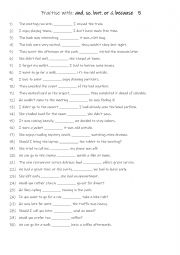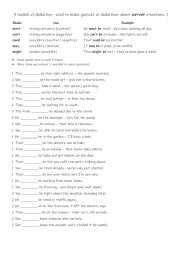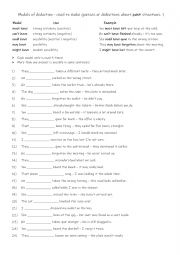
�a or an� - interactive notebook cut-out
cut out, fold along the lines in accordion, glue the top part (a or an) to the page
Level: elementary
Age: 5-100
Type:

TEST_Unit 1
A test for class D
Level: elementary
Age: 10-11
Type:

A1+- A2 Practise with and, so, but, or & because 5
First, students need to familiarise themselves with the 5 linkers and their usage. Then they read the sentences to see which one is needed to complete the gap-fill. Each conjunction is used 6 times! Answers on page 2.
Level: elementary
Age: 8-100
Type:

Where do they want to go Places in a town or city - reasons for going there 1
With answers.
Level: elementary
Age: 7-100
Type:

Fail or Pass
Pair work Interview about pass or fail
Level: intermediate
Age: 12-100
Type:

A2-B1 Gerund or infinitive practise 1
Answers on next page.
Level: elementary
Age: 9-100
Type: worksheet

Practise with past simple or past continuous tense 1
With answers.
Level: elementary
Age: 7-100
Type:

Module 5 Review -7 th grade,of Tunisian Basic Education
Hope you find these review tasks useful :)
Level: intermediate
Age: 11-14
Type:

A2+-B1 5 modals of deduction - used to make guesses or deductions about current situations. 1
Students should learn modals of deduction because they are useful for expressing logical guesses or assumptions about present situations, helping speakers show how certain or uncertain they are. These modals, such as must, might, could, and can�t, make speech sound more natural and fluent, improve communication and reasoning skills, and are commo...
Level: elementary
Age: 10-100
Type:

5 modals of deduction - used to make guesses or deductions about past situations. 1
Students should learn modals of deduction because they are useful for expressing logical guesses or assumptions about past situations, helping speakers show how certain or uncertain they are. These modals, such as must have, might have, could have , and can�t have, make speech sound more natural and fluent, improve communication and reasoning ski...
Level: elementary
Age: 10-100
Type:

Fitness and exercise Gerund or infinitive practise
Answers on next page.
Level: elementary
Age: 8-100
Type:

B1+-C1 20 Idioms and expressions relating to the latest news - good or bad 2
This is a speaking reinforcement activity to supplement the other worksheet I uploaded on 17/1/2025. Students working in pairs or small groups can either ask each other the questions or answer the question themselves.
Level: intermediate
Age: 12-100
Type:

A2-B1 Fitness and exercise Gerund or infinitive practise
Answers on next page.
Level: elementary
Age: 8-100
Type:

Practise with past simple or past continuous tense 2
With answers.
Level: elementary
Age: 7-100
Type:

Where do they want to go- Places in a town or city - reasons for going there 2
With answers.
Level: elementary
Age: 8-100
Type:
|
|
|